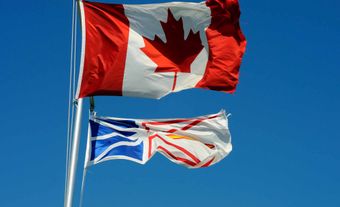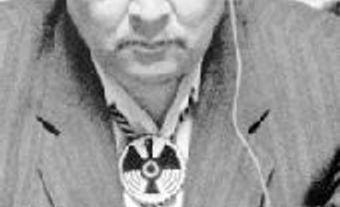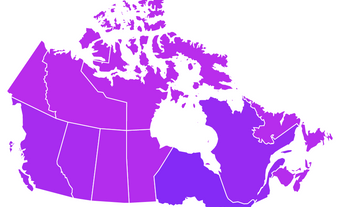This article was originally published in Maclean's Magazine on June 26, 1995
Dumont Supports Separation
Young Mario Dumont could barely suppress a smile of quiet satisfaction. Not quite one month past his 25th birthday, the leader - and sole elected member - of Quebec's fledgling Parti Action Démocratique sat before a bank of furled flags in a sumptuous ballroom in the provincial capital, listening to a siren song of praise from the two battle-scarred overlords of Quebec separatism. "I've never been in better company," crooned Premier Jacques Parizeau as he declared Dumont's presence to be an event of "historic significance." Not to be outdone, Bloc Québécois Leader Lucien Bouchard talked grandly of the sovereignists' "sacred commitment," going on to describe himself as being "very proud" to join hands with Dumont "in the camp for change in Quebec that is growing bigger and bigger."
Those were warm words indeed, particularly coming from a pair of seasoned veterans of Quebec's political wars who had tried their best to bury the callow Dumont and his splinter party at the polls in last September's provincial election. But times change, and last week in Quebec City Parizeau and Bouchard had reason to view Dumont in a more mellow light. The Action Démocratique leader had just signed a pact with the leaders of the two mainstream separatist parties, agreeing to join them in the campaign for Quebec independence after they pledged that the eventual referendum question will include an offer of a new political and economic association with the rest of Canada. And in so doing, Dumont rekindled hopes of a victory for at least some degree of independence in the referendum that is now expected in the fall, most likely late in October.
The pact itself is a simple, even simplistic, affair. In the event of a Yes vote, it gives the Parizeau government a mandate to declare independence but at the same time binds it to opening negotiations with the rest of the country on a new partnership. Independence would not be conditional on a deal with the rest of Canada - Quebec would declare independence within a year of a referendum victory, whether or not anyone in Canada agrees to talk. Canada would be offered membership in a Council of Ministers, composed of an equal number of cabinet members from both sides, with both sides retaining a veto over decisions. There would also be an assembly of parliamentarians, three-quarters drawn from Canada, one-quarter from Quebec, but armed only with the ability to review and recommend. Also envisaged are an economic tribunal to resolve trade disputes and a new bureaucracy to run the administration. And to ensure that Parizeau negotiates in good faith with Ottawa, both Dumont's and Bouchard's parties will appoint representatives to the bargaining team.
Both Parizeau and Bouchard quickly hailed the accord as the breakthrough they have long sought in the thus-far futile effort to sell the independence dream to a majority of Quebecers. Just as quickly, federalists denounced the pact. "It's a sham," declared Quebec Liberal Leader Daniel Johnson. "If the negotiations go well, Quebec will separate. If the negotiations don't go well, Quebec will separate." Similarly, Prime Minister Jean Chrétien dismissed the initiative as "a mirage," the work of a triumvirate of Quebec politicians who "don't have the guts or the intellectual honesty to plainly say they are separatists."
While most federalists confidently predicted that Quebec voters would not buy the new separatist strategy, other voices cautioned that it could expand the base of support for independence by resurrecting the concept of sovereignty-association. Claude Gauthier, vice-president of the Centre de recherche sur l'opinion public (CROP), said that all of the firm's previous surveys found a "slight majority" of Quebec voters in favor of some form of sovereignty-association. When new surveys are completed within the next two weeks, predicted Gauthier, there will be "a probable increase in the level of support for the Yes side."
There is no mystery about the reasons. For while the leader of the Action Démocratique only holds one seat in Quebec's National Assembly, his party currently commands anywhere from 10 to 15 per cent of Quebec voters' sympathies. Most of that vote is conveniently "parked" with Dumont, awaiting a trend the so-called soft nationalist vote, people who are dissatisfied with the current federalist system, but uneasy about voting for the PQ. According to Gauthier, past CROP surveys found that 70 per cent of Dumont's voters would likely reject the independence option in a referendum. "The key now," he added, "is to discover how many of those voters are willing to follow Dumont to the Yes side."
Parizeau and Bouchard clearly hope that enough voters will move to boost the separatist cause from around 40 per cent of the electorate, where it has been mired for the past several months, to an overall majority. As events last week demonstrated, Parizeau is even willing to abandon his own long-standing opposition to any form of sovereignty-association to break the impasse. It may yet founder on the real differences that continue to divide the trio who signed the pact last week. But for now, at least, it has prompted separatists' smiles all around, no matter how fleeting.
Maclean's June 26, 1995

 Share on Facebook
Share on Facebook Share on X
Share on X Share by Email
Share by Email Share on Google Classroom
Share on Google Classroom


